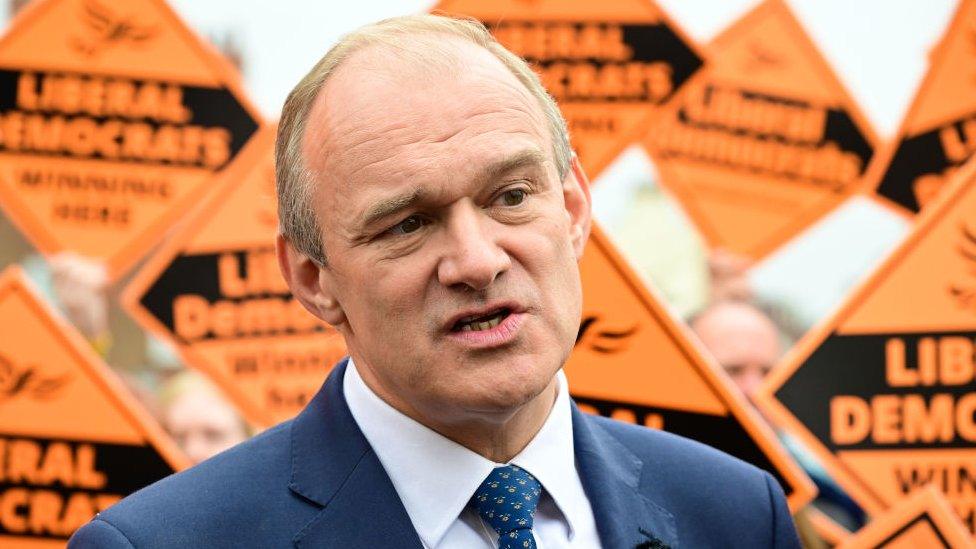Liberal Democrats call for scrapping of energy price cap rise
- Published

"We simply cannot afford more inaction," Liberal Democrat leader Ed Davey said
The Lib Dems have called for October's expected energy price cap rise to be scrapped, with the cost covered by a windfall tax on energy company profits.
Experts expect the energy price cap - the maximum amount suppliers can charge their customers in England, Scotland and Wales - to hit £3,615.
The average bill was £1,400 a year in October 2021.
All households in England, Scotland and Wales will receive £400 to help pay rising fuel bills this autumn.
The scheme is part funded by a windfall tax which has added a 25% surcharge on the profits of the oil and gas sector since the end of May.
Responding to the Liberal Democrat's proposal, a UK government spokesperson said: "We know the pressures people are facing with rising costs, which is why we are providing £37 billion of help for households."
The energy price cap is designed to protect consumers from short-term price changes. It is adjusted every three months and is based on the price energy suppliers pay producers for electricity and gas.
The cap is expected to go up again to £3,615 a year from January next year.
The Liberal Democrats estimate keeping the price cap at its current level of £1,971 will save the average household £1,400 a year.
Without raising the price cap, suppliers will have an estimated shortfall of £36bn. This Lib Dems said this should be met by expanding the windfall tax on oil and gas company profits, and using the higher-than-expected VAT revenues "as a result of soaring inflation".
The current windfall tax is time-limited and is expected to raise £5bn in 12 months. But the Liberal Democrats estimate a windfall tax could raise £20bn, if it is raised to 30% and backdated to October 2021.
The Liberal Democrats have also proposed:
Doubling the Warm Homes Discount to take £300 a year off the heating bills for pensioners and those on a low income, and extending it to all those on universal credit and pension credit
Doubling the Winter Fuel Allowance, giving up to £600 a year to 11.3m pensioners to help with their heating bills.
Liberal Democrat Leader Ed Davey said: "This is an emergency, and the government must step in now.
"Energy bills have already gone up by £700 this year, and Conservative ministers have barely lifted a finger to help.
"We simply cannot afford more inaction in the face of another even bigger rise in October."


How did the Lib Dems calculate the cost?
Energy consultancy Cornwall Insights expects the cap to rise to £3,582 a year in October: £1,518 for electricity and £1,840 for gas.
The Lib Dems have multiplied these figures by the total number of meters: 29m electricity meters and 29m gas meters, according to the official government data.
They then arrived at a figure just short of £36bn, which would be partially paid for by a higher windfall tax of 30% instead of 25%, which would be backdated to October.
The party would also tax the global profits of British energy companies.
The rest would be paid for by the extra VAT revenues the government is collecting due to inflation, with the Office for Budgetary Responsibility expects to total £30bn.


Foreign Secretary Liz Truss, who standing to become the next prime minister, has pledged not to impose more windfall taxes on energy companies.
Ms Truss told the Financial Times that she would "look at what more can be done" to help families facing spiralling fuel bills.
But she added: "The way I would do things is in a Conservative way of lowering the tax burden, not giving out handouts."
A senior ally of Ms Truss later qualified that she had not ruled out giving direct support to families struggling with the cost of living crisis.
Ms Truss has called for green levies to be temporarily halted to help drive down energy bills.
'Go further'
Former chancellor Rishi Sunak, said Ms Truss' original call to rule out emergency payments was "simply wrong" and that her tax cutting plans would further stoke inflation.
Mr Sunak, who is also in the running to be the next prime minister, said he would cut an average of £160 off bills by temporarily scrapping VAT.
He promised to "go further" than plans he launched as chancellor to help families through the cost of living crisis, including a one-off £650 cost of living payment to 8 million vulnerable households.
Related topics
- Published22 October 2024

